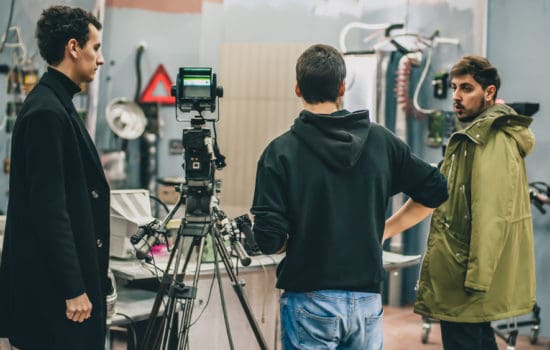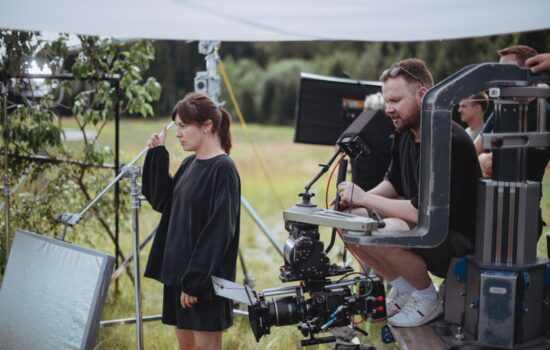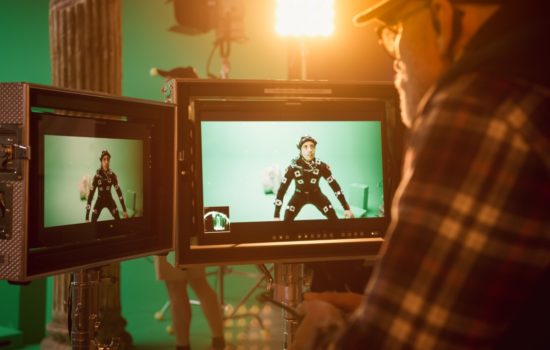Unit Production Manager

How To Become an Unit Production Manager
People also ask
- Is a Unit Production Manager the same as a Line Producer?
- Is a Unit Production Manager below the line?
- What is the difference between a Producer and a Unit Production Manager?
- What is the typical workflow and collaboration between a Unit Production Manager and other key departments during a production?
- How does a unit production manager handle unforeseen challenges during a production?
- How has technology affected the role of a unit production manager, and what tools or software are commonly used in the profession today?
Career Description
The Unit Production Manager or (UPM) oversees the logistics of production. Each morning they mark arrival times for production reports, check-in with each of the crew heads and make sure that load-in is handled correctly. If there are any errors, like parking for example, then they work with the Production Coordinator to fix them and update the production report for the Line Producer.
Anna McNatt, an up-and-coming Unit Production Manager based in Los Angeles states, “This is a heavy paperwork career. Any paperwork that needs to get done or updated passes through the UPM’s hands, except for the Exhibit Gs, which are taken care of by the 1st Assistant Director’s department. If there are personnel issues on set, as in harassment or wage issues, it is recorded by the UPM and then they coordinate with the proper department to resolve the issue.
“You work directly under the Line Producer in running an efficient production. If things are running smoothly, it’s an easy job. However, any hiccups a shoot has are immediately felt by the UPM.”
The Unit Production Manager is an administrative role that helps organize a film set and solves any problems that occur.
Is a Unit Production Manager below the line?
In a word, yes. The Unit Production Manager is typically considered the most senior position of all below-the-line positions.
Salary
The average annual salary for a Unit Production Manager is approximately $70,800. The salary range for Unit Production Managers runs from $47,000 to $103,000.
Due to the freelance nature of the film industry, wages vary from project to project. It is up to the individual to evaluate whether what is offered will work for them.
“Many people will work for free to acquire experience and a credit on a production. However, once you’re more established you’ll receive anywhere from $125 a day to $500 per day. Typically, commercials pay better than narrative work. When it is a longer job, it can often be lower wages because they are providing steady work,” says McNatt.
It’s important to keep expectations low and understand that for the first five years of a career many people will earn minimum wage or less while working multiple production jobs.
Hey, what do you think about trying our new Film Career HelperFilm Career Helper really quick? It’s totally free and could help get your career moving fast! Give it a try. It’s totally free and you have nothing to lose.
Career Outlook
Unit Production Managers are freelance positions. They’re hired in pre-production and work throughout principal photography. Often, most of their work is done during prep to get everything organized, then when production begins, the UPM is on set as a supervisor. During this time, they usually have lots of downtime and can search for future work. However, they’re almost always on call.
McNatt says, “When it’s pre-production, there will be more regular hours with fewer emergency calls to you but as it gets closer to production the schedule intensifies. During a shoot, if pre-production was successful, there will be fewer fires. When a problem does occur, the UPM is usually notified so you can get calls at odd times.”
As a UPM’s career progresses, they’ll be able to turn down jobs and create time off because their network will have expanded. Some people say “sleep when you’re dead” and make sure your phone is always charged.
A Unit Production Manager works in the production department and is in constant contact with the Line Producer and Production Coordinator. They are also a major point of contact for all key crew, including Key Grip, Gaffer, DP, Director, Lead Chef, Key Makeup, Key Hair and Transportation.
Is a Unit Production Manager the same as a Line Producer?
The Unit Production Manager is a separate role from that of Line Producer. The Line Producer’s main focus is the maintenance of a film’s budget and schedule. The UPM is tasked with making sure everything else runs smoothly over the course of a film.
What is the typical workflow and collaboration between a Unit Production Manager and other key departments during a production?
It’s vital that the Unit Production Manager have an effective collaborative process with the other departments in order to ensure a smooth functioning production. Their work begins before production starts and typically ends when principal photography is completed and the shot footage is handed over to the post-production department.
During pre-production, the UPM needs to work closely with the production team and meticulously analyze the script. They need to highlight and collaborate on key requirements such as locations, sets, and production spatiality. UPMs also need to meet with the accounting department to create the overall financial parameters of the production.
Further, UPMs will also work with the Assistant Directors to create a shooting schedule that accommodates the budget and also allows enough time to properly capture the intended creative vision of the project. Technical departments, such as the art and camera departments need to coordinate logistics with the UPM.
Finally (and what some might argue is of most importance), UPMs need to coordinate with the craft service department so as to guarantee the cast and crew are provided with meals and refreshments in accordance with the established production schedule.
Career Path
Almost everyone in production starts as a Production Assistant, then moves onto becoming a Key Production Assistant. From that point, they can either go onto the 1st AD or Line Producer career track. If they choose to go down the Line Producer’s career track, then they’ll become a Production Coordinator and move onto being a UPM.
McNatt says, “It can be a tough struggle to advance because most productions want to hire people with experience. They don’t want to take the hit of working with someone who has never done a specific job before.
“Therefore, it is necessary to work with a Unit Production Manager and try to learn everything possible. The more you can take away from shadowing a professional, the easier it will be on your first job. Additionally, that UPM may recommend you for career opportunities that don’t work for them.”
Low budget and short films are always understaffed so it can be a good idea to work on one for free as a way of earning the credit. Jockey for bigger shoots that pay more and eventually an individual will build a career as a Unit Production Manager. Advancement in this career field is through recommendations.
Getting the first opportunity as a Unit Production Manager usually comes on a low budget feature, short film or student project. “It’s an opportunity to work with a full crew and make mistakes with relatively low consequences,” McNatt advises.
Additionally, many people who are making passion projects will continue to make work and rehire people they trust. It’s a matter of building up a network of referrals. Many times, people will begin as a Production Assistant and work their way up the ladder, meanwhile developing contacts who will refer them to jobs.
For example, working as a Production Coordinator for a Unit Production Manager can lead to UPM work when that person is promoted. The more reliable a person proves him or herself to be, the more likely they will be to book their first job and get rehired by others.
- Download a production report and get familiar with it.
- Find a pre-production packet that outlines every single task and learn it.
- Sit down with a UPM or Production Coordinator and ask them about their experiences.
- Volunteer to work as a PA on a local set.
What is the difference between a Producer and a Unit Production Manager?
Given that the Unit Production Manager is the person who makes sure that the filmmaking process is a smooth one, they will typically work very closely with the Producers on a film. They often will report to the Producers with any issues or to coordinate the resolutions to those issues.
How does a unit production manager handle unforeseen challenges during a production?
Nearly every film faces its own set of unforeseen challenges, and they’re usually impossible to predict. Whether it’s sudden script adjustments or changing weather or malfunctioning equipment, or everything in between, a UPM needs to be ready to adapt to anything. Here are a few steps in accomplishing that…
- Assessment
- Communication And Collaboration
- Consider The Budget
- Shift The Schedule
- Record The Changes
- Keep Morale High
The first order of business with any unforeseen challenge is to assess it and analyze its potential hazard to the production. Ask, how disruptive will this be to the budget, schedule, and workflow?
Immediately notify the proper and relevant department leads of the situation. It’s vital that everyone be informed of the situation and have them weigh in as necessary. Brainstorm potential solutions, think them through, then decide on the best course of action.
Money can often solve many problems on productions. If it’s within the budget to fix the issue at hand financially, UPMs need to work with the finance and accounting departments to use the resources accordingly.
Sometimes, a revision to the production schedule is necessary to get things back on track. This can be anything from changing call times, to moving shoot days, to adjusting the other timeline of the production (with a goal in mind to be the least disruptive to the original plan as possible).
UPMs will want to keep detailed records of every shift they make to the production. Whether it’s budgets, schedules, or crew changes, it’s imperative to keep a live record of all changes that are made.
UPMs need to make sure their production’s crew remains in good, workable spirits throughout the shoot. A key way to accomplish this is via communication with the teams and keeping an honest, open rapport about the reasons behind whatever changes that occurred.
Experience & Skills
The most important skill set for a Unit Production Manager is organization. They are going to be dealing with hundreds of pages of paperwork and if any of those contracts are needed, then they need to be provided in an instant. If a Police Officer shows up to check on the location permit of a shoot, then the faster a UPM can present the proper paperwork, the faster production can continue.
Additionally, there is a lot of communicating with each individual department. McNatt elaborates, “Part of the UPM’s duties is to oversee the Production Coordinator, so they must know the ins and outs of where everyone is supposed to be. This can only be accomplished by listening to each individual department head and understanding their needs. It’s impossible for one individual to know everything that is going on and is required, to make a film shoot run. It’s a team effort.”
The more a UPM is organized, the more effective they can be in recognizing a problem and solving it before that issue can become worse.
When it comes to experience, it is important to get a solid education. That can happen at a film school or through shadowing a Unit Production Manager. However, it is very crucial to get applied experience as well. That can come in the form of working on short films and low budget independent films before moving on to a larger production.
Hollywood is a small community and most opportunities come through referral. Therefore, it’s important to do the job a couple of times over before agreeing to take on a big commitment. Taking on a large job too early can stunt someone’s career for a couple of years.
Many Unit Production Managers have a type-A personality and a can-do attitude. McNatt states, “They are part of the engine that drives production forward. It’s up to them to make sure that every department has everything they need for success. That can include additional hires or putting in a gear order.
“If the UPM is lazy or unapproachable, then the production will suffer because key crew will either pick up the UPM’s slack and do the work themselves, which takes away from them doing what they should and/or things will slip through the cracks.”
Essentially, the UPM is one of the last lines of defense against problems so this needs to be an individual who can be counted on to show up full of energy, ready to take on the day. That doesn’t mean they need to be necessarily introverted or extroverted, just accountable with an eye for detail.
Education & Training
McNatt says, “I would definitely recommend going to film school and then getting a master’s degree as a Producer. It’s important to pick the right film school because it will provide the necessary training and connections to get an individual working. Otherwise, many people learn on the job, which can be difficult for a Unit Production Manager.”
Most of the UPM’s work on a production is done in pre-production. They handle all insurance, crew deal memos, gear orders and the organization of contracts. Essentially everything should be set up as much as possible so that when it comes time to shoot, the Production Coordinator knows exactly what should be happening where.
Then, if there are any problems on set, the Unit Production Manager can hop in to help solve them. However, if they’re tied up with paperwork that should have been done in pre-production, the efficiency of the film shoot will suffer. Therefore, whether studying at a film school or learning on the job, it’s important to get the right training, which will be refined over time through repetition.
How has technology affected the role of a unit production manager, and what tools or software are commonly used in the profession today?
As technology continues to evolve, new tools and software are becoming readily available to aid UPMs. Let’s take a look at a few…
- Digital Script and Communication Tools
- Script-Sharing Platforms
- Scheduling And Budgeting Software
- Cloud-Based Storage
- Electronic Call Sheets
- Expense Tracking
Because they operate in real-time, communication tools like Microsoft Teams and Slack have proven to be terrific aids in facilitating collaborative work from multiple team members.
Celtx and StudioBinder allow online script-sharing and opportunities for collaborations that had never existed before.
Software tools Gorilla Scheduling, StudioBinder, and Movie Magic Budgeting have made managing schedules and budgets infinitely easier and efficient.
Cloud storage programs such as Box, Dropbox, or Google Drive allow seamless access and sharing of contracts, permits, and other essential documents.
Gone are the days of piles of paperwork, as call sheets can now be updated and distributed digitally.
Software like Ease Entertainment and QuickBooks have become essential tools in terms of simplifying payroll managements, expense tracking, and financial reporting for UPMs.
Additional Resources
There are various guilds, associations and social media groups that cater to Unit Production Managers. (Women in Film is an incredible organization, no matter what an individual’s gender is.) There are also Facebook groups like I Need a Producer, a collective of working professionals who will answer questions, provide basic paperwork and post current job opportunities. Other great places to go for networking are film festivals.
McNatt says, “In every state, a film festival is hosted that has panels and mixers. It is common to meet local crew and people who are working. Finally, check out colleges with strong Masters of Fine Arts programs such as the American Film Institute. Even if a person isn’t attending, those programs constantly have film shoots so it can be a good place to pick up jobs and practice skill sets.”
A UPM should look at almost any film organization or mixer as a place to pick up jobs and rely on online Facebook groups as a resource for information.
FAQ
What is the single biggest suggestion you would give to someone wanting to get into this career?
“Show up to every available set in the beginning. At the end of the day, you’re going to learn the most by getting involved and gaining practical experience. This is also a good way to network and develop mentors. Don’t be afraid to ask questions about why paperwork is organized a specific way. There is usually a reason.
“Additionally, the more personal relationships someone has, the more context they’ll have to ask the right questions. Offer to go above and beyond once a task has been taught, like doing the grunt work of filling out a production report and a veteran Unit Production Manager will bring you on to future jobs. By showing up and proving to be an asset that’s reliable, you can create future work and means to learn the trade.”
What’s the #1 mistake people make when trying to get into this career?
“Hasty decision-making can lead to lots of trouble. There is a lot of pressure in pre-production and on a film set. Unfortunately, lots of people are opportunists so if they notice that a Unit Production Manager is green then they’ll take advantage of that.
“It’s important to take a deep breath and ask for help when needed. There is nothing wrong with going to a mentor or reaching out to a Facebook group for ideas on how to handle a situation. The more methodical a person is in the beginning, the fewer problems they’ll create for themselves down the road.
“The Production Department is a forward-thinking group that is trying to anticipate problems before they happen. Every production is its own little monster so the more clearly tasks are delegated, the smoother a set is going to run. If a decision is made without forethought it can either sink a production or make a myriad of problems down the road.”
What is the question people should ask about this career but rarely do?
“What is the best way to befriend a mentor?
“Most people never inquire how a person is doing on set, whether they’d like a cup of coffee or something from Craft Services. Usually, it is divided by department. If someone is trying to break in as a Production Assistant looking for a mentor, one of the best things they can do is to cross borders and put in extra effort to make someone else feel good.
“Never underestimate the power of creating a personal connection. Many people will spend countless hours sending out introductory letters or applying to jobs on Mandy.com, however, taking a couple days out of their week to get on a good show and support a working professional can lead to many more career opportunities.”
What is one thing I should have asked which I didn’t?
“What gets overlooked?
“It is quite common for a UPM to be dealing with multiple issues on a film set and forget that each person has a specific function and needs to be respected. It’s not so much an issue of being mean but remembering that if a Grip has an issue with their paycheck or a safety issue, then they need personal attention.
“If they feel ignored, their disgruntled nature can spread to other people within the department. If one department goes down, then it slows the entire shoot. Therefore, taking the time to listen to each person and make them feel special will inadvertently make the entire production move at a faster pace.”
If you could describe in one word what makes you successful, what would it be?
“Passion.”
Sources

Anna McNatt
Anna McNatt came out to Los Angeles in 2012 to begin working in the film industry. She graduated with a BFA from Woodbury University and immediately began production coordinating and unit production managing for Victory Hill Exhibitions while directing, producing and ADing multiple short films and web series on the side.
She joined the Aletheia team in 2017 and is involved in each production that passes through. Working hand in hand with Robert Rippberger, she helps spearhead these incredible projects forward.
References
- 1Multiple. "Unit Production Manager Salaries in United States". Glassdoor. published: Feb 11, 2016. retrieved on: Dec 12, 2019



















